Do you know? The Central Government has initiated the Krishi Sakhi Yojana to train 70,000 women in advanced farming techniques to boost rural economy.
The Ministry of Agriculture and Rural Development will operate this program to enhance women’s engagement. Both ministries have signed an MoU for this purpose.
Krishi Sakhi Yojana: Exploring Through A New Lens
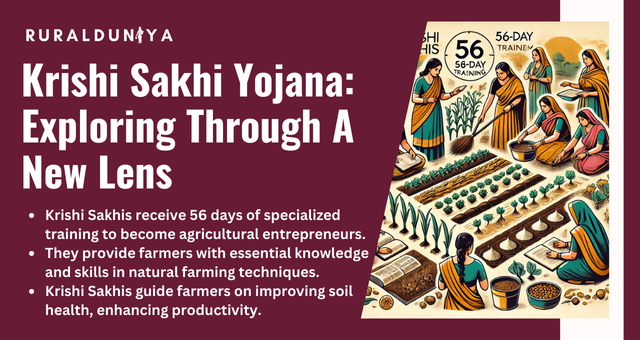
Krishi Sakhis are agricultural practitioners who have received training as para extension professionals, working at the grassroots level.
The role of Sakhis is to serve as a valuable resource for farmers by providing them with essential information, skills, and guidance on various aspects of Natural Farming and Soil Health Management.
They aim to enhance farmers’ knowledge and abilities in emerging areas of Natural Farming and contribute to improving Soil Health.Under this program, qualified women will receive specialized training in several agricultural tasks. The duration of this training program will last 56 days.
Upon completion, the Sakhi will utilize their newfound knowledge and skills to assist farmers as agricultural entrepreneurs within the rural communities.
Objective of Krishi Sakhi Yojana
The main objectives of launching Yojana are –
- Enhance the capabilities of women in rural areas through agricultural training.
- Strengthen the involvement of women in agriculture production and advising services.
- Empower women to achieve a yearly income of 60,000-80,000 rupees.
- Facilitate the comprehensive advancement of the agriculture industry.
Krishi Sakhi Convergence Program (KSCP)
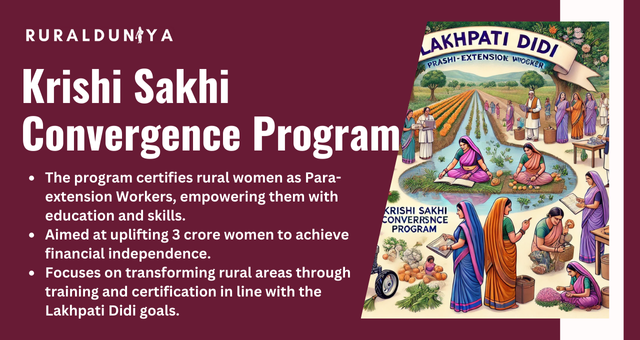
The objective of the ‘Lakhpati Didi‘ initiative is to empower and uplift 3 crore women to become financially independent. One aspect of this program is the Krishi Sakhi component.
The KSCP seeks to empower rural women in rural India by educating and certifying them as Para-extension Workers, with the goal of transforming rural areas. This certification course is in accordance with the goals of the “Lakhpati Didi” Program.
Benefits of Krishi Sakhi
The benefits of yojana are –
- This program aims to empower women by training them to become agricultural allies.
- The government’s objective is to train 20 million women as Krishi Sakhi.
- These Sakhis will employ contemporary agricultural techniques to enhance farming productivity.
- By engaging in this activity, a woman has the potential to generate an extra annual income of approximately 80 thousand rupees.
- The user’s text consists of a bullet point symbol.So far, around 34,000 Krishi Sakhis have been awarded the certificate of Para Extension Activist.
- During the initial stage, a total of 90,000 women hailing from 12 different states would undergo training.
- If these ladies demonstrate exceptional performance, they will get a Para Extension Certificate and an additional 56 days of advanced instruction.
Krishi Sakhi Training
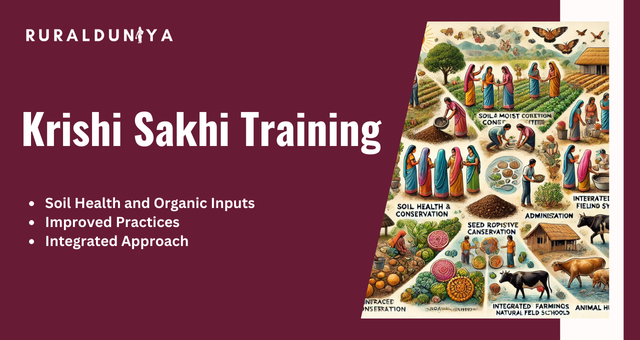
Types off training for Krishi Sakhis are –
- Training on soil health and techniques for conserving moisture.
- Implementation, organization, and utilization of organic inputs.
- Creation and administration of a seed repository.
- Implementation of improved agricultural practices, encompassing all stages from land preparation to harvesting.
- A system that combines different agricultural activities into one cohesive and interconnected approach.
- Facilitating the establishment of farmer field schools.
- Natural farming using the Manage and Holiday Natural M. method.
- Training in animal husbandry and associated topics.
Krishi Sakhi NRLM Concept
On June 18, 2024, Prime Minister Shri Narendra Modi will confer certificates to over 30,000 self-help groups, recognizing them as Krishi Sakhis, in Varanasi.
The Ministry of Agriculture and Farmers’ Welfare and the Ministry of Rural Development signed a MoU on 30.08.2023 to acknowledge and enhance the valuable role and contribution of women in agriculture, as well as to further develop the capabilities of rural women.
The KSCP is an ambitious endeavor outlined in this Memorandum of Understanding.
Krishi Sakhi MANAGE Partnership

This is to gradually raise awareness and provide training to 70,000 Krishi Sakhis on Natural Farming and Soil Health Management. After the training, the Sakhis will organize awareness activities in SHGs, Schools, Anganwadis, Gram Panchayats, Village Organizations, and communities.
The objective of this training is to generate a ripple effect, whereby Sakhis serve as catalysts for the acceptance of ecologically sustainable and economically feasible farming practices, resulting in enhanced agricultural output, improved soil quality, and overall community well-being.
Currently, the Sakhis are receiving refresher training that specifically emphasizes Natural Farming and Soil Health Card. This training is being conducted by DAY-NRLM agencies in collaboration with MANAGE.
Krishi Sakhi Salary Per Month
Here is a comprehensive list of all the available training options that individuals might pursue in order to get a stable wage.
| Department | Training | Resource Fee per Krishi Sakhi per year |
| INM Division Soil Health and Movcdner | Soil sampling, providing soil health advice, forming farmers’ organizations, training farmers | INR 1300 Soil Health INR 54000 Movcdner Only. |
| Crop Division | Cluster front line demonstration, data collection and uploading | INR 10000 |
| Crop Insurance Scheme | Mobilizing non-loanee farmers, loss of money | INR 20000 |
| Department of MIDH | Creating awareness about Horticulture Mission | INR 40000 (per block) |
| NRM Division Rainfed Area Development RAD, Agro Afforestation, Per Drop More Crop | Training on climate resilient agricultural practices, distribution of seedlings, use of micro irrigation | INR 12000 |
| Agriculture Infrastructure Fund | Outreach agent, facilitating projects, raising awareness | INR 5000 |
| Seed Division – Seed Village Programme | Training farmers on seed production | INR 900 per training |
Krishi Sakhi Exam Paper
Upon completion of the Krishi Sakhi Yojana training program, Sakhis will be required to undergo a competency test.
Upon successfully completing this examination, students will receive certification as para extension workers, granting them eligibility to partake in a range of training programs offered by the Ministry of Agriculture and Farmers Welfare.
Krishi Sakhi Apply Online
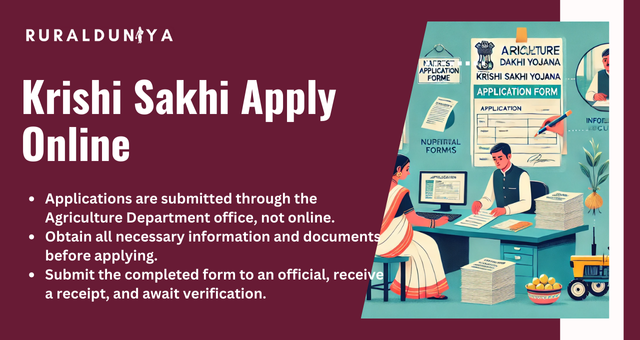
The application process for Yojana is conducted entirely through traditional means, without the use of online platforms or technology.
To submit an application through traditional means, please adhere to the following instructions:
- Initially, make contact with the nearest office of the Agriculture Department.
- Prior to submitting an application, ensure that you have obtained comprehensive details regarding the Yojana.
- You will now receive an application form.
- Please ensure that you provide all the essential information in this application form accurately and include the necessary documents together with the form.
- Lastly, present the completed form to the relevant official.
- The user’s text is a bullet point.Subsequently, you will receive a receipt that should be securely retained.
- Upon verification of your application, you will be chosen as a Krishi Sakhi.
Krishi Sakhi Eligibility Criteria
Eligible candidates for the yojana are –
- All female applicants must hold Indian citizenship.
- Applicants must be at least 18 years old.
- This initiative is open to women belonging to the low-income group.
- In order to become a Krishi Sakhi, a woman must possess agricultural expertise.
- Only females residing in rural regions are eligible to apply.
Krishi Sakhi Documents Required

List of required documents are –
- Aadhaar card or identification card
- Proof of address
- Certificate of income
- Certificate of caste
- Bank account passbook linked to Aadhaar
- Mobile phone number
- Passport-sized photograph
Krishi Sakhi Yojana Launched States
The 12 states where the initial phase of Yojana has commenced are as follows:
- Chhattisgarh
- Karnataka
- Maharashtra
- Tamil Nadu
- Gujarat
- Uttar Pradesh
- Andhra Pradesh
- Jharkhand
- Rajasthan
- Meghalaya
- Madhya Pradesh
- Odisha
MOVCDNER Scheme
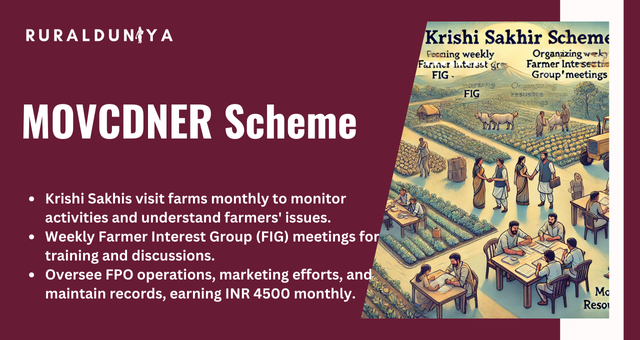
As part of the MOVCDNER (Mission Organic Value Chain Development for North Eastern Regions) project, there are currently 30 Krishi Sakhis who serve as Local Resource Persons (LRPs). These LRPs visit each farm once a month to monitor farm activities and gain an understanding of the issues faced by the farmers.
Additionally, they organize weekly meetings at the Farmer Interest Group (FIG) level to provide training to farmers, engage in discussions to comprehend the difficulties encountered by farmers, monitor the operations of the Farmer Producer Organization (FPO), and oversee marketing efforts.
They also keep a record of farmer activities in a journal. The specified activities yield a monthly resource fee of INR 4500.
Takeaway
As part of Krishi Sakhi Yojana to empower women in rural India, this yojana provides them with training and certification to become para-extension workers in the agricultural sector.
‘Lakhpati Didi’ is a program that is committed to empowering women economically and empowering them to become self-sufficient. This effort falls under that program.
FAQs
What is the work done by Krishi Sakhi?
The Sakhi supports SHG and household sustainable agriculture livelihoods. A Sakhi pool will provide basic technical support and therapy to rural farmers.
What is the salary of Krishi Sakhi?
The annual earnings of an average Sakhi range from INR 60,000 to 80,000.
Who can apply for the Krishi Sakhi Yojana?
Rural women interested in farming can apply. A Self Help Group is recommended but not required. Applicants must be fit and passionate about promoting new agriculture methods.
Where can I apply for the Krishi Sakhi Yojana?
Usually, applications are filed through your local district agriculture office. Speak with them about any upcoming training programs and the most recent application process.

Nishank is a social impact enthusiast with a solid foundation in public policy, micro-enterprise, and agribusiness. Growing up in a farmer’s family has given him a profound connection to rural communities, fueling his passion to empower people towards self-reliance. He completed his undergraduate studies at the Delhi University and earned a master’s degree in Rural Management from National Institute of Rural Development & Panchayati Raj in Hyderabad.


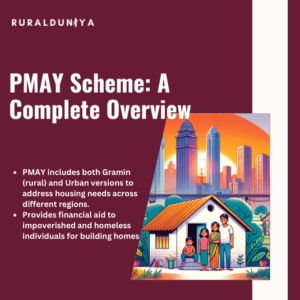

Minaj faras I am missing the training krushi sakhi Maharashtra district satara
आमच्या गाव मध्ये सरपंच नि नाव दिलं एका महिलेच आणि कृषि सहाय्यक नि कृषि सखी बनवून घेतलं बाकी गावातील कोणत्याच महिलेला माहिती नव्हती ही पोस्ट आणि न सरपंच नि सांगितलं